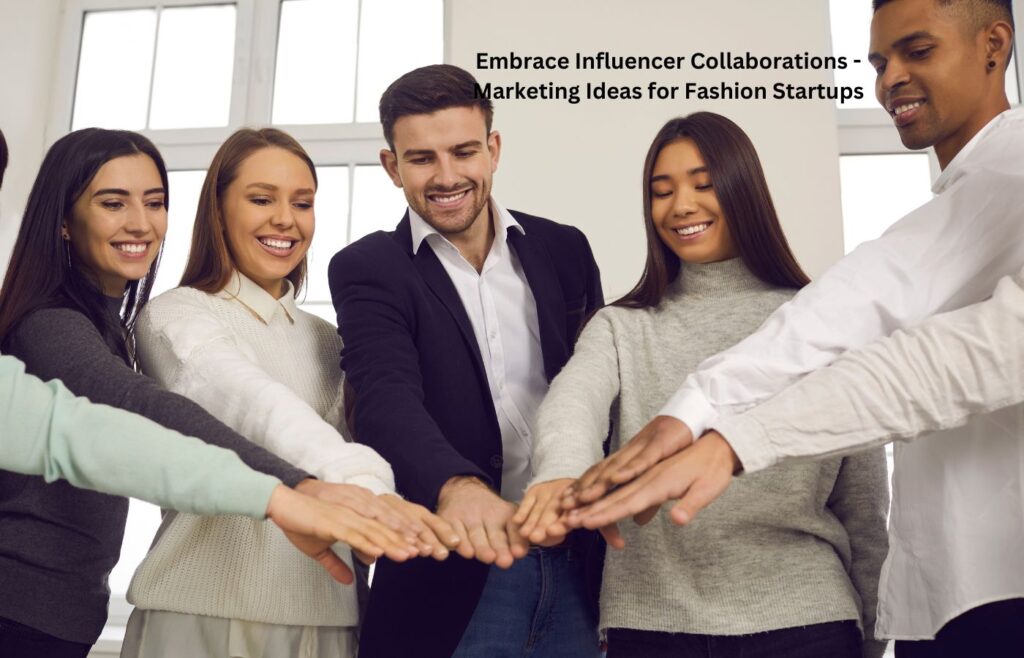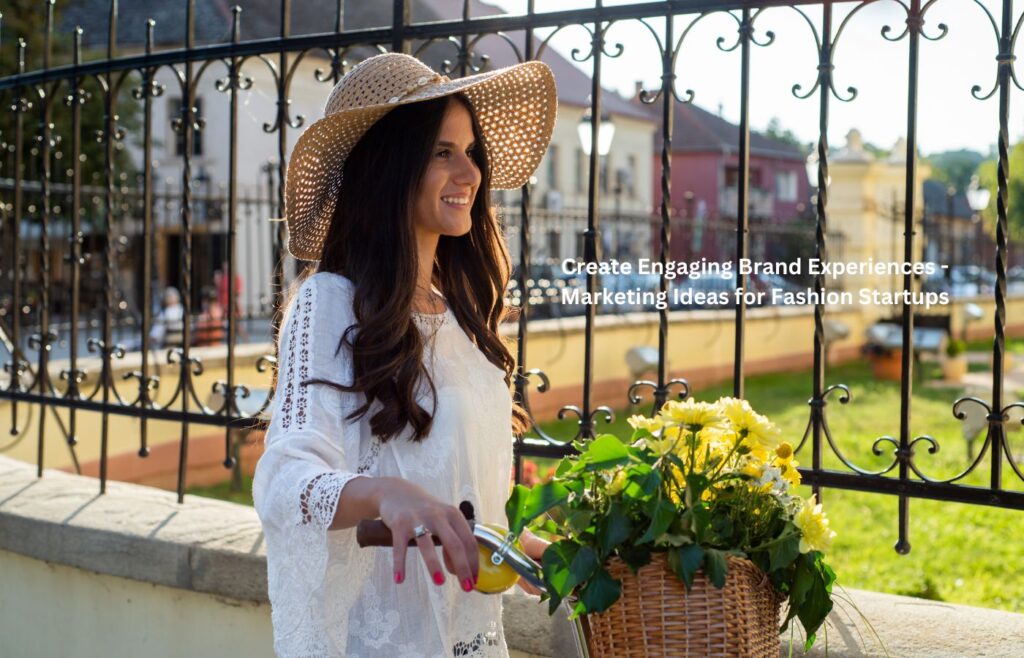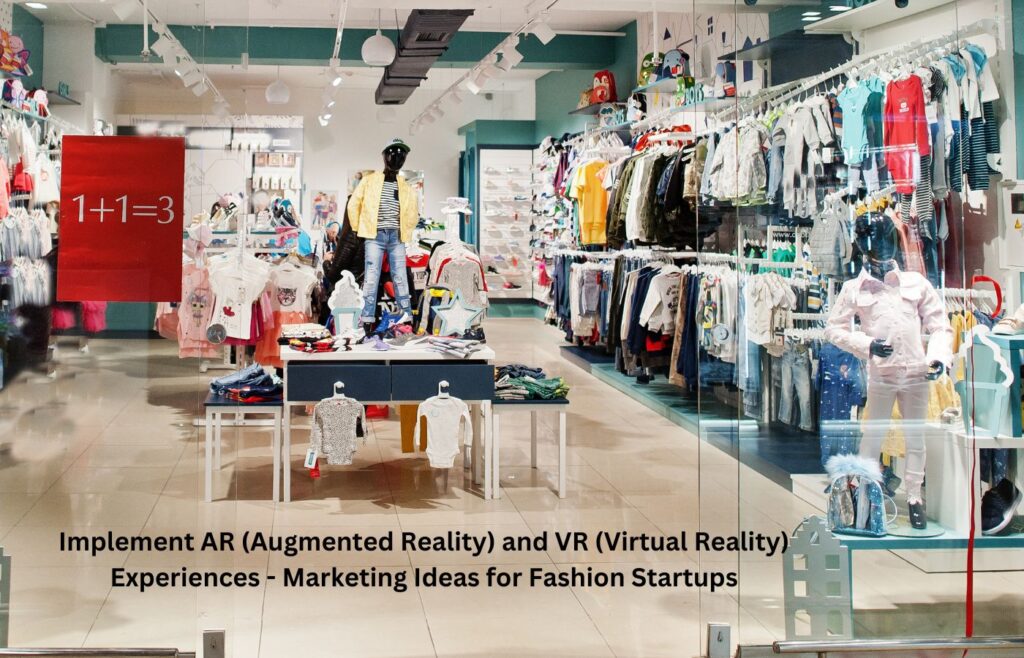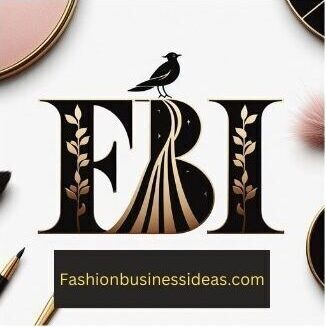Introduction – Marketing Ideas for Fashion Startups
Launching a successful fashion startup requires more than exceptional design skills—it also demands creative marketing approaches that attract attention, engage audiences, and establish a distinct brand identity. Fashion startups face fierce competition and changing consumer tastes, so they must employ creative marketing approaches that resonate with modern audiences.
This article presents seven creative marketing ideas for fashion startups designed specifically to increase brand visibility, attract customers, and accelerate growth within an increasingly competitive fashion startup market.
Fashion industry trends, social media, and consumer demands for personalized experiences are increasingly affecting fashion business startups, necessitating them to use emerging technologies and consumer insights to create impactful marketing campaigns that cut through the noise.
Influencer collaborations have become a staple of modern fashion marketing, enabling startups to leverage the reach and credibility of influencers to connect authentically with their target demographic. User-generated content (UGC) also plays an essential role in building community and encouraging authenticity, allowing customers to become brand advocates by sharing their experiences and marketing ideas for fashion startups.
Fashion startups can set themselves apart by adopting Sustainability as part of their core marketing strategy, appealing to environmentally aware consumers. Augmented reality (AR) and virtual reality (VR) experiences can enhance customer engagement while creating immersive brand interactions, blurring the lines between online shopping and physical shopping experiences.
Fashion startups can hone in on a niche by working with emerging artists, using data-driven personalization, and crafting unforgettable brand experiences through pop-up shops or events. By doing this, they can secure themselves a specialized spot and lay a strong foundation for sustainable growth and marketing ideas for fashion startups.
Overall, this article will explore innovative marketing ideas for fashion startups and provide them with actionable insights and practical strategies for navigating competitive environments and finding success within fashion marketing.
Embrace Influencer Collaborations – Marketing Ideas for Fashion Startups

Influencer collaborations have emerged as effective marketing ideas for fashion startups looking to enhance brand visibility and engage their target audience more authentically and relatable. By teaming up with influencers, startups can tap into their power as people who resonate with their values and aesthetics. When selecting influencers for collaborations, authenticity must always come first: look for influencers whose style complements your fashion offerings while building rapport among their followers.
Micro-influencers are invaluable assets to marketing ideas for fashion startups. They provide access to more engaged audiences for targeted marketing campaigns. By working with these influencers, startups can tap into specific demographics or communities while simultaneously creating genuine interest and interaction for their brand.
Startups looking to maximize the effectiveness of influencer collaborations should focus on crafting authentic and engaging content that resonates with an influencer’s audience. Encourage influencers to showcase your products through various creative avenues—styling tips, behind-the-scenes video content, or product reviews are just a few examples—to drive conversion and brand loyalty among customers. Authenticity is essential for developing consumer trust and loyalty, and it should drive conversion and brand loyalty efforts forward.
As part of your social media efforts, consider hosting influencer events or exclusive collaborations to generate excitement around your brand. Collaborative efforts such as limited-edition collections or influencer-led campaigns can create an air of exclusivity and urgency that encourages followers to engage with your product/service and make purchasing decisions based on trusted recommendations from trusted figures.
Influencer collaborations offer fashion startups an effective means of expanding their reach, building credibility, and cultivating meaningful connections with their target audiences. By including influencer marketing as part of their marketing strategy, marketing ideas for fashion startups can tap the power of trusted voices to move their brand forward in an already competitive industry.
Harness User-Generated Content (UGC) – Marketing Ideas for Fashion Startups

Fashion startups can leverage user-generated content (UGC) as an effective marketing strategy tool to increase brand visibility, engage community members, and develop trust among potential customers. UGC refers to any user-created material such as photos, videos, reviews, or testimonials featuring products or experiences offered by fashion startups and marketing ideas for fashion startups; including it in your marketing plan can bring many advantages when seeking to establish an online presence.
UGC stands out as an authentic form of social proof. Consumers trust the content their peers produce rather than traditional advertising; encouraging customers to post reviews through UGC can create a sense of community and authenticity around your fashion startup brand and marketing ideas for fashion startups.
Startups wishing to harness UGC’s power effectively should employ strategies that encourage and facilitate user participation. Hold UGC contests or campaigns that enable customers to create and share content about your products with each other; offer rewards or recognition for outstanding submissions to promote participation while showing off user creativity.
Once collected, UGC can be utilized across various marketing channels to increase its impact. Repurpose it on social media, incorporate it into email campaigns, or feature it prominently on your website – sharing UGC showcases satisfied customers and encourages others to connect with your brand and contribute their content! Reposting UGC highlights customers while inspiring new ones to interact with it by inviting participation by posting it publicly and inviting more engagement.
UGC can offer unique insights into customer preferences and behaviors. By closely following UGC trends and feedback, marketing ideas for fashion startups can use user-generated content to gain invaluable information on customer responses that resonate with their target market and inform future marketing strategies. Fashion startups can foster meaningful connections with customers while driving organic growth through authentic brand advocacy by listening and taking advantage of user-generated content.
Create Engaging Brand Experiences – Marketing Ideas for Fashion Startups

Fashion startups can delight audiences and leave lasting impressions by offering engaging brand experiences beyond traditional marketing approaches. By connecting emotionally with customers through such experiences, fashion startups can foster greater brand loyalty while engaging them on a deeper level.
Pop-up shops or temporary retail activations are one effective method for creating memorable brand experiences for customers. They allow them to engage with your products in an immersive and memorable setting. Pop-up shops should reflect your brand identity and values as well as any elements that might engage the senses and spur curiosity among attendees. Furthermore, you could host exclusive events or workshops at your pop-up to amplify the experience and increase foot traffic.
Fashion startups can leverage technology to create virtual or augmented reality (VR/AR) experiences that bring their brand to life online. Create virtual fitting rooms so customers can visualize how your clothing looks and fits, host virtual fashion shows or product launches, and immerse viewers in your brand story and collections – and more!
Engaging in events or activations that showcase your brand’s lifestyle and values is another innovative strategy. Work with artists, musicians, or influencers to craft immersive multisensory experiences that resonate with target audiences — for instance, hosting fashion showcases with live performances or interactive installations that align with your brand’s aesthetic are great ways of doing this.
Fashion startups prioritizing immersive brand experiences can set themselves apart in a competitive market, create deep emotional bonds with customers, and drive online and offline engagement. Align immersive experiences with your brand values and target audience to ensure meaningful interactions that leave lasting impacts.
Leverage Sustainability as a Marketing Strategy – Marketing Ideas for Fashion Startups

Fashion startups can leverage Sustainability as part of their marketing strategy to set themselves apart, attract environmentally aware customers, and contribute positively to social causes. As consumer awareness of environmental issues increases, making sustainability part of your core marketing approach can resonate strongly with today’s ethically aware consumer audience.
Begin by communicating your brand’s sustainability efforts openly and honestly. Stress using eco-friendly materials like organic cotton, recycled fibers, or plant-based alternatives in your product offerings; emphasize ethical sourcing practices like fair labor standards; share stories and insights regarding your supply chain to build trust with consumers; and emphasize environmental responsibility production processes.
Position your brand as an answer to fast fashion’s negative impacts by informing consumers about sustainable consumption, showcasing durable products as alternatives to disposable trends, and emphasizing environmental advantages associated with choosing sustainable clothing, such as reduced carbon emissions, water conservation, and waste minimization.
Engaging with sustainability-focused communities and organizations effectively spreads your message and expands its reach among conscious consumers. Partner with eco-friendly influencers and environmental nonprofits or take part in sustainability initiatives to demonstrate your brand’s dedication to making a difference and show that its commitment hasn’t gone unnoticed by consumers.
Integrate Sustainability into your brand storytelling and marketing campaigns. Create original content highlighting your mission, values, and impact on the planet; use images that elicit emotional responses while driving consumer action toward aligning their purchasing decisions with their beliefs.
Implement AR (Augmented Reality) and VR (Virtual Reality) Experiences – Marketing Ideas for Fashion Startups

Fashion startups that incorporate Sustainability as the core theme in their marketing strategy can create a stronger brand image, draw customers who value such initiatives, and contribute towards building a more eco-friendly fashion industry.
Fashion startups can transform how customers engage with their brands by employing AR and VR experiences to engage customers more deeply and increase brand affinity. These immersive technologies create engaging interactions that bridge digital with physical worlds for a seamless customer journey and better engagement overall.
Startups are using AR in fashion to create virtual fitting rooms. These rooms enable customers to try on clothing and accessories virtually from the convenience of their own homes using AR apps or tools developed for this purpose. Such virtual fitting rooms enhance online shopping experiences by decreasing uncertainty regarding fit decisions and increasing confidence when making purchasing decisions.
VR experiences can also be an innovative way for fashion startups to showcase collections and connect with customers. Fashion shows or product launches hosted through VR provide viewers with an immersive and captivating way of experiencing and interacting with a brand’s latest offerings; traditional media cannot match this level of interactivity and storytelling, making VR an excellent way to capture attention and leave lasting memories behind.
AR and VR technologies can also be integrated into physical retail spaces to enrich customer experiences and boost foot traffic. Fashion startups may implement interactive displays, AR-enabled mirrors, or VR installations that offer personalized recommendations or product information, further enhancing customer journeys while drawing more people through the door.
Fashion startups that embrace AR and VR experiences stand out in an increasingly competitive market by showing innovation and differentiating themselves through consumer engagement, brand buzz, and increased excitement surrounding the brand. AR/VR technologies present fashion startups with untapped opportunities for creating immersive brand experiences that resonate with modern consumers.
Collaborate with Emerging Artists or Designers – Marketing Ideas for Fashion Startups

Fashion startups can inject creativity and generate buzz by partnering with emerging artists or designers. Collaborative relationships offer mutual benefits; companies can use artists’ unique talents while giving these emerging creatives exposure and support.
Startups looking to form collaborations should identify artists or designers whose aesthetic aligns with their brand values, such as emerging talents whose work resonates with your target audience and complements your fashion offerings. Engage in meaningful dialogue to set joint goals and creative visions for this collaboration.
Collaborations take many forms, from limited-edition collections to co-branded events or campaigns. Fashion startups can collaborate on creating exclusive apparel or accessory lines featuring artwork or designs by emerging artists. This adds artistic flare and storytelling elements that make products more collectible among customers.
Collaborative events or activations can create memorable brand experiences. Host art exhibitions, gallery showcases, or workshops highlighting your collaborative process and inviting customers to interact with you and the featured artist(s). This creates community engagement while also positioning the startup as an arts advocate.
Fashion startups can collaborate with emerging artists to set themselves apart, access new creative energies, and reach wider audiences. Such partnerships present opportunities for cross-promotion and exposure via artists’ networks and followers, expanding reach while strengthening brand credibility and the credibility of a fashion startup.
Relying on emerging artists demonstrates a commitment to creativity, innovation, and cultural relevancy while strengthening brand narrative and connecting with consumers seeking unique and authentic experiences. Fashion startups should embrace collaboration as an initiative to establish meaningful connections and inspire fresh forms of expression within the industry.
Implement Data-Driven Personalization – Marketing Ideas for Fashion Startups

Through data-driven personalization strategies, fashion startups can improve customer experiences and drive engagement. By tapping into customer data, they can offer highly relevant content, recommendations, and promotions tailored to individual customer preferences and behaviors.
Start by gathering and analyzing customer data across various touchpoints—website interactions, purchase history, and social media engagement. Leverage customer relationship management systems (CRM) and analytics tools to gain insights into customer preferences, shopping habits, and demographic data.
Segment your customer base based on common attributes or behaviors to develop targeted marketing campaigns that resonate with each customer’s interests or preferences. Email campaigns with product recommendations based on past purchases or browsing behavior could prove effective here, while dynamic website content could display products that align perfectly with each customer’s interests.
AI-powered algorithms can be implemented to enhance marketing efforts and predict customer behavior in real time. Machine learning allows product recommendations and promotional offers to be optimized in real time, and predictive analytics identifies trends or anticipates customer demand for specific styles or collections.
Integrate personalized customer experiences across all customer touchpoints, such as social media interactions and mobile app experiences. Use retargeting ads to reach out to previous interactions with your brand in a relevant way.
When implementing data-driven personalization, prioritize transparency and customer privacy. Get consent for using customer data before explaining its benefits to customers. Finally, comply with data protection regulations to build trust while upholding ethical standards.
Fashion startups that embrace data-driven personalization can leverage it to establish more meaningful customer connections, increase conversion rates, and develop long-term loyalty among their target market. Customized experiences demonstrate an understanding of customer needs and preferences and thus give fashion startups an advantage in an industry driven by customer-centricity and innovation.
Conclusion – Marketing Ideas for Fashion Startups
Fashion startups possess an arsenal of innovative marketing strategies to establish themselves and attract customers authentically while driving growth within an increasingly competitive industry. These startups can stand out and form long-term relationships with their target audiences by harnessing creativity, technology, and customer-centric approaches.
Influencer collaborations give startups an effective strategy for authentically connecting with their target demographic through influencer collaborations and user-generated content (UGC). User-generated content shows testimonials from real customers, which resonate with potential customers, creating a community.
Immersive brand experiences, such as pop-up shops, virtual reality (VR) showcases, and interactive events, create memorable interactions that leave lasting impressions of brands. Such experiences enhance brand storytelling and engagement between online and offline interactions.
Sustainability has become a powerful marketing strategy, drawing the interest of eco-conscious customers. Startups emphasizing eco-friendly practices and ethical production can attract a growing segment of conscious customers looking for sustainable options.
Collaborations between fashion collections and emerging artists or designers bring innovation, culture, and community context into fashion collections, furthering cross-promotion and expanding brand reach.
Data-driven personalization enables startups to provide targeted content and recommendations explicitly tailored to individual preferences, increasing customer satisfaction while simultaneously driving conversion rates.
Successful fashion startups understand the significance of constant innovation and adaptation to respond to shifting consumer preferences and market dynamics. By adopting creative marketing ideas and strategies, these fashion startups can thrive in a competitive landscape while building brand equity for future success in an ever-evolving fashion industry.
Innovation is vital for fashion startups looking to stand out in an overcrowded marketplace. Those who embrace creative marketing approaches will be best equipped to thrive and leave an indelible mark on the industry.
How do augmented reality (AR) try-ons work, and why should my startup invest in this technology?
AR try-ons use technology to allow customers to virtually try on clothing and accessories using their smartphones or devices. Investing in AR can enhance the online shopping experience, reduce returns due to size or fit issues, and differentiate your brand as innovative and customer-centric.
What is user-generated content (UGC), and how can it help promote my fashion startup?
User-generated content involves customers creating and sharing content (like photos or videos) featuring your products on social media. UGC is powerful for building brand authenticity, fostering community, and leveraging word-of-mouth marketing.
Why should my fashion startup consider limited edition drops as a marketing strategy?
Limited edition drops create a sense of exclusivity and urgency among your audience, driving higher demand and excitement for your products. They can help generate buzz, encourage faster sales, and cultivate a loyal customer base.
What are some sustainable fashion initiatives my startup can implement for marketing purposes?
Implementing sustainable practices and showcasing them in your marketing can attract eco-conscious consumers. Highlight eco-friendly materials, ethical production processes, or initiatives like recycling programs to demonstrate your brand's commitment to sustainability.
How can collaborations and partnerships benefit my fashion startup’s marketing efforts?
Collaborating with other brands, influencers, or artists can expand your reach by tapping into their existing audience. It also adds credibility and uniqueness to your brand, making it more attractive to potential customers.
What types of interactive content are effective for marketing fashion startups?
Interactive content like quizzes, polls, or style challenges can engage your audience and encourage participation. It's a fun and interactive way to showcase your brand's personality, gather insights about customer preferences, and drive traffic to your website or social media platforms.
The article “7 Innovative Marketing Ideas for Fashion Startups” is written by Farhanul Haque, Fashion Business Ideas. Our team of passionate writers and experts shares tips and inspiration on gardening, home improvement, and design to help you create your dream space.







